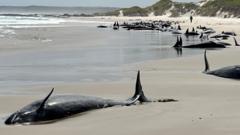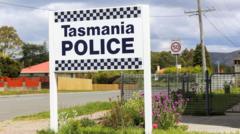More than 150 false killer whales stranded on a remote Tasmanian beach face euthanasia due to difficult conditions preventing their rescue. The event marks a significant incident in the region, highlighting ongoing concerns about whale strandings in Tasmania.
Tragic Mass Stranding: Euthanasia Planned for Over 150 Whales in Tasmania

Tragic Mass Stranding: Euthanasia Planned for Over 150 Whales in Tasmania
Following a mass stranding event, authorities in Tasmania have decided to euthanize dozens of false killer whales as rescue efforts fail.
In a heart-wrenching incident, over 150 false killer whales are set to be euthanized following a mass stranding on a secluded beach in north-west Tasmania. The pod, comprising 157 animals, was discovered near Arthur River, with approximately 90 still alive as of Wednesday. Despite the presence of survivors, experts declared that the complex conditions rendered rescue attempts futile.
False killer whales, closely related to dolphins, can grow as large as 6 meters (19 feet) and weigh around 1.5 tonnes. Unfortunately, this stranding marks the first observed mass event for this species in Tasmania in over five decades, although the region has seen several such incidents in recent years, including the catastrophic stranding of hundreds of pilot whales in 2020.
Eyewitness reports describe distressing scenes at the beach, with local resident Jocelyn Flint recalling the sight of the whales, especially the young ones, seemingly pleading for help. "Their eyes are open, they're looking at me, like 'help'," she lamented.
Marine biologist Kris Carlyon emphasized the challenging access to the location, which features steep and narrow roads impractical for transporting necessary rescue gear. Attempts to relocate and re-float the stranded animals proved unsuccessful, with many unable to navigate the rough surf, prompting Dr. Carlyon and his team to make the tough choice of euthanasia for the remaining whales.
With similar rough conditions forecasted for the following days, the authorities decided to act swiftly to prevent further suffering of the stranded animals. Dr. Carlyon explained that the decision to euthanize was made after all other options were exhausted, noting that the well-being of the animals was the main priority.
The grim task of euthanasia is set to commence soon, with discussions ongoing about the disposition of the whales' carcasses, given the area's cultural significance for Aboriginal communities. Meanwhile, local authorities have warned the public to stay away from the site due to nearby bushfires and hazardous access roads.
Australia's Tasmania has been noted as a hotspot for whale strandings, with over 80% occurring within the region. As marine experts continue to study these tragic events, various theories emerge regarding the causes of mass strandings, including disorientation from hunting practices or individual animals leading groups astray.



















